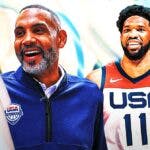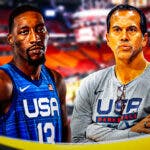Team USA saw a quick end to their 2019 FIBA World Cup dream of snatching the gold, losing to France 89-79 in the quarterfinals. Not even an hour has passed since the final whistle sealed the Americans' fate and the witch hunt for who is to blame has already gotten underway.
The United States hasn't seen the need to point the finger so desperately since Team USA managed a bronze medal in both the 2004 Athens Olympics and the 2006 World Cup. So who really is to blame for this disappointing outcome? The answer isn't all that simple, considering the myriad of factors that played into this loss.
Blame FIBA
For making the ridiculous decision to change the tournament into odd years in hopes of not competing against FIFA and its outstanding dominance in the ratings. The FIFA World Cup happens in between June and July, not August and September — making that a ridiculous and unnecessary change to accommodate their own selfish interests.
FIBA's hope to reel in the most money and attendance possible has worked to a certain degree, but to the detriment of their product. Team USA has sold out arenas since the 1992 Dream Team first took the floor filled with NBA superstar talent. The same holds true today. Yet no one expected to pay for their ticket to go watch Brook Lopez, Derrick White and Mason Plumlee play.
However FIBA didn't just screw NBA players, but also several European ones with its dumbfounding qualifying process that now included a soccer-like qualification windows in November, February, and June/July for round-robin qualification games. European players are in-season during November and February and will have to choose whether to play for their respective teams or represent their country. The NBA however is in season during all three of those windows, rendering players unable to play.
Former NBA commissioner David Stern said it best in a conversation with Marc J. Spears of The Undefeated:
“FIBA made a mistake moving the World Cup into odd years. And as a result, you are asking players to play in the FIBA World Championship, play in the season and then play in the Olympics. And I think that pushed a lot of players to feel that they should make a choice between back-to-back years of international competition.”
Jeff Van Gundy's team comprised of G League and overseas talent was forced to come to the rescue to qualify the United States for the World Cup and as a result, no NBA player saw action at the international level since the 2016 Rio Olympics.
Blame the NBA
For not accommodating its schedule to help increase the gap between the end of the tournament and the start of the NBA season. Blame the teams for not being flexible with their attendance policies for training camp, considering there should be exceptions made for players coming from national duty, something that exists in soccer, rugby, and other sports.
The NBA rakes a lot more revenue than FIBA does and is by default the bigger worldwide name, but that shouldn't automatically make it so that they don't have to move a hair and help its athletes take part in international competition. While The Association is independent from FIBA, it still largely benefits from the international exposure of its athletes in foreign countries, perhaps even more so than the multitude of offseason events that bring legends of the sport and active ones to countries like China, India, and many African nations.
Blame the players
That held out of a commitment to Team USA and had a selfish approach in the wake of a difficult situation. While it's true that the NBA has the biggest free agent galore in its history and moved more than a third of its players to other destinations in a wild summer, many players who didn't move locations chose to put their NBA team before their country and said “thanks, but no thanks” when called up to participate.
Stars like James Harden, Eric Gordon, Andre Drummond, Damian Lillard, CJ McCollum, and others that remained with their teams had also excused themselves from the convocation process citing fatigue or “focusing on the upcoming season” — instead choosing to focus by playing runs at local open gyms with their friends from the league.
Others like De'Aaron Fox entertained the notion of playing for Team USA and then withdrew before making the trip to Australia for the last three exhibition games before the World Cup. These players had a choice and they overwhelmingly chose their own selfish interest over their country.
Blame the rest of the world
For getting increasingly better every year and making competition all the more difficult for the Americans. The NBA gets more and more international players every year — and there's plenty of more talent that has yet to get noticed by The Association.
Team USA saw it with Turkey in a close tilt that took them to overtime and saw them escape with a one-point win thanks to a pair of timely Khris Middleton free throws down the stretch. The United States simply didn't pass the eye test, nor the analytical one — never looking as dominant as other iterations have in international competition.
Blame France for smelling blood and cashing in against a vulnerable American team that struggled to find buckets late in the fourth quarter and struggled to hit free throws in a close game — the universal recipe for losing a high stakes game.
Blame it all to hell
We can sit here and point fingers to an endless amount of factors that played a part in the USA's misfortune, but it's all part of a larger construct. Winning is not given, it is earned.
The U.S. has managed to have a dominant run for nearly 30 years since allowing NBA players to take the court against their international competition, but rules change, players change, and so do the stakes of competition.
USA Basketball must now find a way to hunt for the gold by other means than having supreme talent at hand. Players will have to be better, coaches will have to be better, the NBA must help facilitate participation as FIBA's inept decision isn't likely to be backtracked this soon — but most importantly fans will need to shed the notion that it's gold or nothing — an arrogance that deserves these types of disappointments after years of international delight.
After all, it is that sense of entitlement from the fan base that has driven many players away from participating, as the only 12 players remaining for this USA roster were the 12 courageous enough to embark on a mission that had more downsides than rewards for their respective careers.




